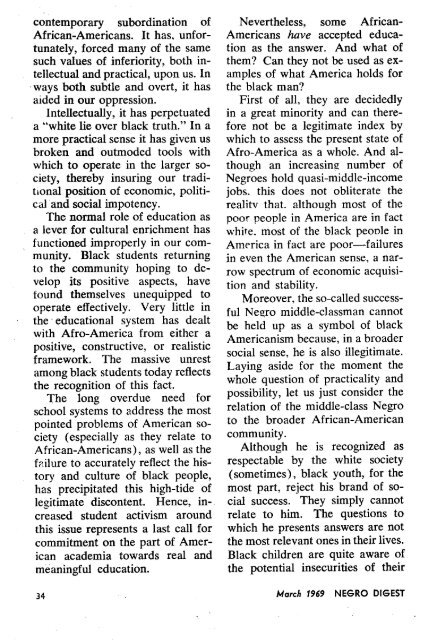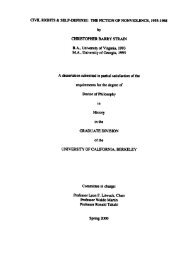Negro Digest - Freedom Archives
Negro Digest - Freedom Archives
Negro Digest - Freedom Archives
You also want an ePaper? Increase the reach of your titles
YUMPU automatically turns print PDFs into web optimized ePapers that Google loves.
contemporary subordination of<br />
African-Americans . It has, unfortunately,<br />
forced many of the same<br />
such values of inferiority, both intellectual<br />
and practical, upon us . In<br />
ways both subtle and overt, it has<br />
aided in our oppression.<br />
Intellectually, it has perpetuated<br />
a "white lie over black truth." In a<br />
more practical sense it has given us<br />
broken and outmoded tools with<br />
which to operate in the larger society,<br />
thereby insuring our traditional<br />
position of economic, political<br />
and social impotency .<br />
The normal role of education as<br />
a lever for cultural enrichment has<br />
functioned improperly in our community<br />
. Black students returning<br />
to the community hoping to develop<br />
its positive aspects, have<br />
found themselves unequipped to<br />
operate effectively . Very little in<br />
the educational system has dealt<br />
with Afro-America from either a<br />
positive, constructive, or realistic<br />
framework. The massive unrest<br />
among black students today reflects<br />
the recognition of this fact .<br />
The long overdue need for<br />
school systems to address the most<br />
pointed problems of American society<br />
(especially as they relate to<br />
African-Americans), as well as the<br />
failure to accurately reflect the history<br />
and culture of black people,<br />
has precipitated this high-tide of<br />
legitimate discontent . Hence, increased<br />
student activism around<br />
this issue represents a last call for<br />
commitment on the part of American<br />
academia towards real and<br />
meaningful education.<br />
34<br />
Nevertheless, some African-<br />
Americans have accepted education<br />
as the answer. And what of<br />
them? Can they not be used as examples<br />
of what America holds for<br />
the black man?<br />
First of all, they are decidedly<br />
in a great minority and can therefore<br />
not be a legitimate index by<br />
which to assess the present state of<br />
Afro-America as a whole . And although<br />
an increasing number of<br />
<strong>Negro</strong>es hold quasi-middle-income<br />
jobs . this does not obliterate the<br />
reality that. although most of the<br />
poor people in America are in fact<br />
white . most of the black people in<br />
America in fact are poor-failures<br />
in even the American sense, a narrow<br />
spectrum of economic acquisition<br />
and stability .<br />
Moreover, the so-called successful<br />
<strong>Negro</strong> middle-classman cannot<br />
be held up as a symbol of black<br />
Americanism because, in a broader<br />
social sense, he is also illegitimate.<br />
Laying aside for the moment the<br />
whole question of practicality and<br />
possibility, let us just consider the<br />
relation of the middle-class <strong>Negro</strong><br />
to the broader African-American<br />
community .<br />
Although he is recognized as<br />
respectable by the white society<br />
(sometimes), black youth, for the<br />
most part, reject his brand of social<br />
success . They simply cannot<br />
relate to him. The questions to<br />
which he presents answers are not<br />
the most relevant ones in their lives .<br />
Black children are quite aware of<br />
the potential insecurities of their<br />
March 1969 NEGRO DIGEST
















